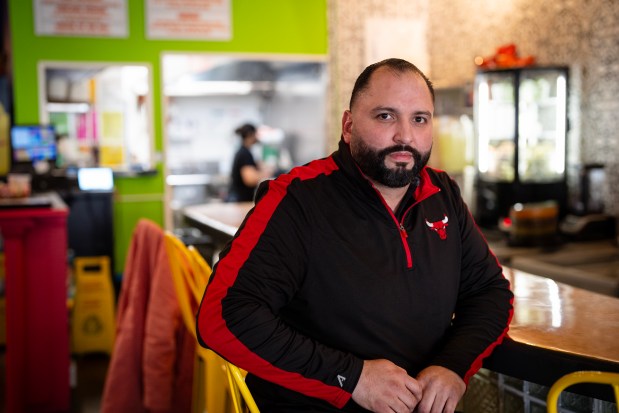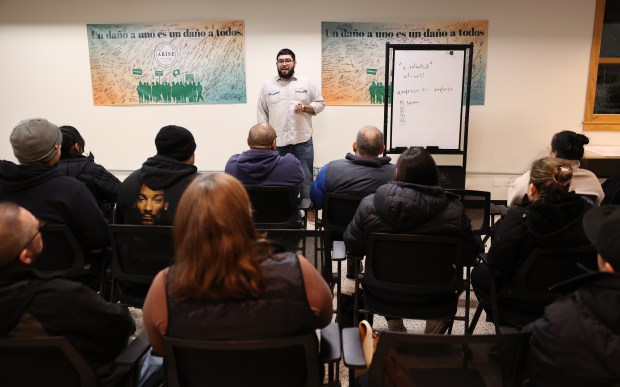For the first time in her 15 years working in a Chicago restaurant, Malena knows what to do if immigration officials come knocking at her workplace.
Malena, who spoke on the condition that the Tribune not publish her last name or the restaurant where she works, is one of the Chicago-area restaurant workers living and working in the shadow of President Donald Trump’s immigration crackdown.
In an industry that relies heavily on the labor of immigrants, restaurant workers like Malena, their advocates and employers have spent the last few weeks educating themselves and each other on their immigration rights and preparing for what to do if confronted by U.S. Immigration and Customs Enforcement officers.
According to the National Restaurant Association, 21% of restaurant workers and food service employees in the United States were born outside the country. That includes workers who have obtained legal status and those without. The Center for Migration Studies, however, recently estimated that there are 1 million undocumented workers employed in restaurants.
So far, workplace raids at local restaurants have not materialized, although rumors of them have flourished at times. Sam Toia, the president of the Illinois Restaurant Association, said Friday that he was not aware of any ICE activity at Chicago restaurants.
But for some workers and restaurateurs, the anxiety of possible raids is hard to avoid.
Malena remembers the fear that came with Trump’s first term. Eight years later, she said, it is worse.
“It’s on the news, in the newspapers, on social media,” Malena said in Spanish. “Every day they don’t talk about anything but immigration, immigration, immigration. And all of that creates fear, dread, distrust in the community.”
To arm herself and to help alleviate her anxiety, Malena has attended several “Know Your Rights” sessions hosted by the workers center Arise Chicago. Almost immediately after the November election, Arise created a 32-page immigrant worker toolkit to help its members and their families be prepared for potential raids at work.
The toolkit, available online, includes detailed illustrations on how to proceed if approached by ICE. Agents cannot enter a workplace without a warrant signed by a judge, for instance. The guide includes warnings such as, “If the employer or someone with authority lets them in, ICE no longer needs a warrant,” so people realize how important it is to not open that door hastily, explained Shelly Ruzicka, Arise’s communications director.
Arise Chicago staff has been encouraging people to keep a copy of the toolkit on hand, whether printed out and taped across the inside of the door or a pocket-size card for easy access.
Learning her rights, Malena said, “has prepared me for how I can defend myself as a person and as a worker.”
Another restaurant worker, who spoke on the condition of anonymity, said she keeps a “Know Your Rights” card in her wallet and car.
The restaurant worker declined to disclose her immigration status, but said she wanted to share what she’s seeing in her majority Latino community, where she’s worked at a local restaurant for almost 10 years.
“Everyone is scared about what’s happening,” she said. “Many people don’t know our rights, and that is what creates the fear. Resident or not, immigrant or not.”
People are worried, she said, about what will happen to the lives they’ve built in the United States. She hears people asking, “What will happen to my house? What will happen with this, what will happen with that, what do I do?”
Arise Chicago trainings have empowered her to educate others, she said.
“I feel good because I’m helping the next person, so that they’re not afraid,” she said.
Ruzicka said she hopes the grassroots effort in Chicago to mobilize immigrant communities with the right information will pay off, no matter where they get the tools. In a recent interview with CNN, former ICE Acting Director Tom Homan, whom Trump appointed as his “border czar,” acknowledged the city is “very well educated.”
“They’ve been educated (on) how to defy ICE, how to hide from ICE,” Homan said. “They call it ‘Know Your Rights.’ I call it ‘How to Escape Arrest.’”
Still, there are concerns that ICE may try to do things they aren’t legally allowed to do, Ruzicka added.
Ruzicka said ICE agents might say that they can come into a restaurant without a warrant because it’s a public space, but there are some protections around what’s accessible to them within that space.
“Where people sit to eat and where customers go is public, but the kitchen or the back of the house is considered a private space,” Ruzicka explained. “That’s something we are making sure restaurant workers and owners know because they might be like, ‘What do I do? What is my legal responsibility protecting my employees? What is actually lawful if ICE comes to my door?’”
There also are new operations under way within the effort. Under Trump, it has become more common for officers to arrest people without legal status if they come across them while looking for migrants targeted for removal. Under President Joe Biden, those “collateral arrests” were banned.
Restaurant owners, some of whom spoke on the condition that the Tribune not disclose their names or their restaurants, are preparing alongside workers and their advocates. One of those restaurateurs posted a “Know Your Rights” flyer in his kitchen. Another chef said he was keeping a binder of talking points at the front door of his restaurant of what to say if ICE agents tried to enter.
The owner of a popular Far North Side tavern said he had told Hispanic employees that they should carry copies of their documents, such as their I-9’s or Social Security cards, with them to work.
“Some of them who are completely documented don’t have confidence that the agents will be very discerning,” he said. The restaurateur fears that not being white, or that speaking with an accent, could be enough to draw suspicion from federal immigration officials.
Cesar Gonzalez, the owner of L’Patron in the Logan Square and Bucktown neighborhoods, said he spoke to a friend who works in the state attorney’s office to prepare for potential knocks from ICE agents, who have also been targeting immigrants without a criminal record.
“I just needed to have the information just in case — he told me in order for (ICE) to go into the employee area of my business, they would need to have a signed warrant from a judge,” said Gonzalez, who is a U.S. citizen. “If they come in asking for somebody, I have to confirm if that person works here. It would be illegal for us to lie to them, but if they don’t work there, and you got the wrong person, I’m not going to allow you to talk to anybody else because you’re not here to look for anybody else.”
Gonzalez said immigration officials “showed up for lunch” at L’Patron’s Bucktown location on Wednesday, sending a quiet panic from the front-of-house to the kitchen.
“They walked in with bulletproof vests, I couldn’t make out the name at first, but I got closer and saw the big yellow letters,” Gonzalez said.
The employee who served the men asked if they were “doing a raid,” Gonzalez said.
They said no, but confirmed to the server that they were from Homeland Security and were in Bucktown “patrolling the neighborhood.”
“It was strange because you hear lots of stuff about ICE being around, but it’s like a ‘see it to believe it’ thing,” Gonzalez said. “It is them — they are around.”
For the most part, Gonzalez said customers who were at L’Patron didn’t seem to notice the officials, but one man abruptly left and “looked uncomfortable.”
Restaurant owners and workers alike said they’ve noticed that the potential raids have, at times, kept workers and customers from showing up, or staying.
However, for some restaurant workers, like the employee who carries the “Know Your Rights” card in her pocket, there is little choice as a single mom.
“I have to go to work,” she said, explaining that she has no choice but to resume her daily life as the “head of her household.”
But she’s seeing how panic is affecting the neighborhood where she works.
“Many people aren’t going out to shop because they’re scared that if they leave the house, they won’t return,” she said. “If that were to happen, it makes you worried about what might happen to your kids.” She also worries about the broader economic impact that could have. If people aren’t buying things, there won’t be as much work for people like her, she said.

Gonzalez has noticed the decrease in business, too. The regulars who come in for Mexican street food at either L’Patron location aren’t filling as many tables as they did a few weeks ago, he said.
“Just the thought that there could be a raid is upsetting, you shouldn’t be turning your shoulder or looking around your back this often, or like every Ford Explorer that you see set up, you’re already assuming it’s ICE,” Gonzalez said. “There’s a sense of being watched.”
For some restaurant staffers, that feeling has followed them to work.
At the end of January, a bartender saw what she thinks were federal immigration officials through the window of the Mexican restaurant where she works in Deer Park, a suburb of just a few thousand people northwest of Chicago.
The officials were camped out in the parking lot outside the restaurant for about an hour, she said, explaining that workers saw the letters “ICE” on some of their jackets.
The bartender, who spoke to the Tribune on the condition of anonymity, said she is a DACA recipient with legal status to work in the U.S. But she is nervous for her co-workers, whose immigration statuses she does not know, and for people she knows in the community who are undocumented.
“They’re not doing anything bad,” the bartender said. “They’re just working.”
During her shift that day, the restaurant’s manager locked the building’s back door. Staff on the second shift were instructed to come in the front door as customers do. One of her co-workers said she wanted to go home.
The bartender said the officials didn’t come into the restaurant, but the possibility of that made it difficult for her to think about anything else.
She said she texted family and friends, and she and her co-workers called colleagues who weren’t in that day, letting them know they should be careful.
She said customers also noticed the officials outside and asked the workers if they were OK.
“They said, ‘Careful, there’s immigration out there.’”
ICE did not respond to requests for comment.
Chicago Tribune’s Nell Salzman contributed.




